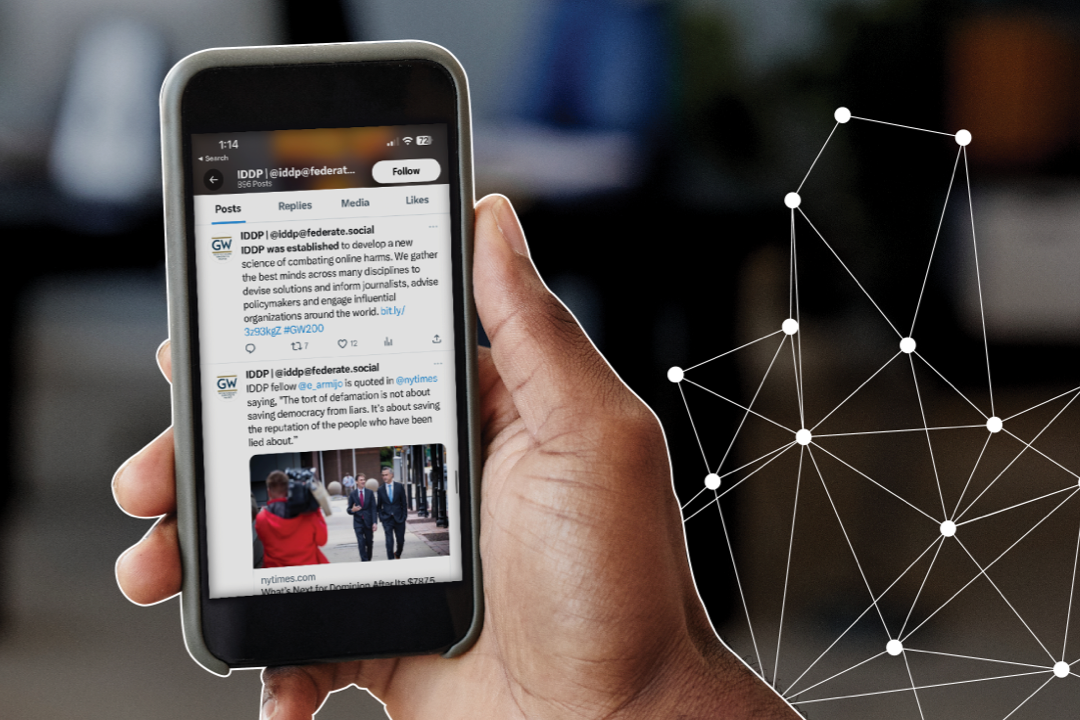Research 2024
GROUNDBREAKING RESEARCH & DISCOVERY
As part of TRAILS, GW Engineering Associate Professor Chung Hyuk Park and Professor Zoe Szajnfarber are working with University of Maryland faculty to extend access to care for autistic children and their families using intelligent robots
Building Tech We Can Trust
As artificial intelligence is increasingly integrated into our daily lives, we must find ways to design it in a way that builds trust. The GW Trustworthy AI Initiative (TAI) is a groundbreaking nerve center for research, education, and collaboration to inform the creation and use of responsible technology.
Bridging the gap between scholarship and policy is one of GW’s enduring strengths. At GW TAI, researchers across a range of disciplines are working with government, community, and corporate partners to apply rigorous academic research to inform policy and solve real-world problems. SAIC, a Fortune 500 technology company, is the inaugural partner.
“Partnerships with leaders like SAIC facilitate two-way dissemination: we expect the industry’s experience to inspire our research, and our novel solutions to inform their practice.”
— Zoe Szajnfarber, GW TAI faculty director
A wide range of federal investment enables GW TAI to convene multidisciplinary, multi-institutional teams to jumpstart innovation:
The Institute for Trustworthy AI in Law & Society (TRAILS), a GW co-led multi-institutional project, has received $20 million from the National Science Foundation and the National Institute of Standards and Technology to develop AI technologies that promote trust and mitigate risks, while empowering and educating the public.
A $6 million award from NASA is supporting a GW-led team of researchers who are investigating how to protect autonomous flying aircraft from cyber attacks that could disrupt safe operations.
GW’s Ph.D. Fellowship in Co-Design of Trustworthy AI Systems has received $3 million from the NSF to prepare future researchers and policymakers to navigate the opportunities and risks of embedding AI in systems.
With funding from the NSF, researchers in the the Behavioral Research Insights & DiGital Health Technology (BRIGHT) Institute at the Milken Institute School of Public Health are developing an AI-powered smoking cessation tool using ChatGPT.
GW faculty and students have launched more than 350 new ventures and raised $1.8B in follow-on funding.
GW and the Smithsonian Institution have long partnered to advance knowledge, education, and cultural enrichment. Not only do GW students have access to a wide range of internships within the Smithsonian complex, we collaborate on joint research initiatives such as the Slave Wrecks Project, an exhibit on the natural history of the cell phone, and animal locomotion studies with salamanders and sea lions at the National Zoo.
The National Institutes of Health awarded GW researchers $6.4M to study how the impact of repetitive head injuries from American football and social determinants of health contribute to later-life cognitive function in adult Black male athletes.


